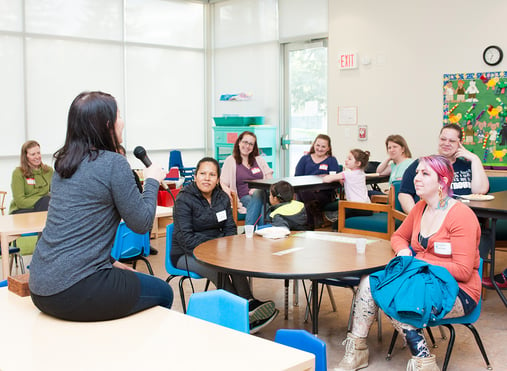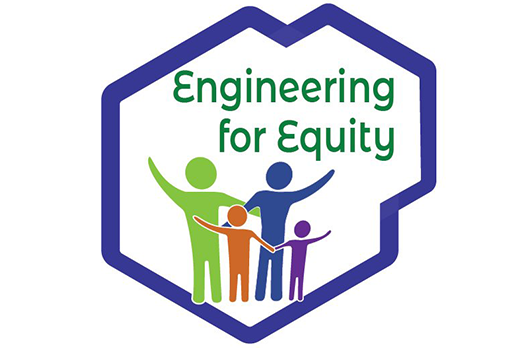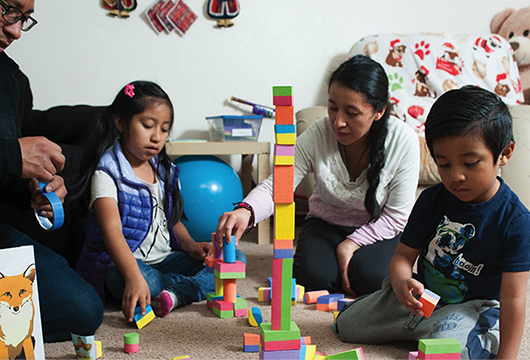TERC Blog
Part 2 - Engineering for Equity: Family Collaboration, post 1
Rethinking Our Approach to Collaborating with Families to Study and Support Engineering Learning
Nosotros venimos de muchos lugares diferentes y siempre logramos adaptarnos. No nos limitamos, siempre pensamos en lo que podemos hacer. Aunque tengamos poco, siempre lo compartimos y envolvemos y ayudamos a otras personas. Relacionado al aprendizaje, los padres latinos valoran el aprendizaje y le gusta que sus niños aprendan más de lo que ellos han aprendido—que lleguen mas lejos que lo que hemos podido hacer.
[We come from many different places, and we always manage to adapt. We don’t limit ourselves. We always think about what we can do. Although we might not have much, we share what we have, involve ourselves, and help others. Related to learning, Latino parents value learning and want their children to learn more than they have—to go farther than we have been able to go.]
— program participant
Welcome to the Engineering for Equity blog series. As we shared previously, the Engineering for Equity project was an opportunity for us to gain some perspective on our current work, reflect on our assumptions, learn from others, and explore new ways that our research could both uncover and help dismantle inequities and racism in the STEM education system. Our work is situated at the intersection of engineering education, family learning, early childhood, and equity. As informal STEM learning researchers, we focus on studying and supporting ways that young children and their families engage with and develop long-term interests in engineering and other STEM topics through everyday learning experiences outside of school, including how these experiences are connected across contexts and over time.
Over the last year, we spent this time talking to families and leaders in our community, interviewing experts on the intersection of equity and STEM education across the country, and reading reports and literature. This blog series is the result of that process, which we hope will not only help advance our own thinking and practices but also serve as a catalyst for deeper discussions across these fields.
In today’s post, we reflect on how our conversations and readings have made us rethink assumptions about families, our approaches to family research, and the ways we support engineering learning for both children and parents. As we have discussed elsewhere, this focus is particularly relevant during the global health pandemic, when educators have been forced to seriously consider the important role of family learning at home.

Reflecting on Our Assumptions about Family Learning
Reviewing the literature on family learning and equity is a stark reminder of how plagued the STEM education field is by outdated models, perspectives, and assumptions about family learning and parent engagement. It’s also a reminder of how personal these topics are—how our own cultural experiences related to families and child development are deeply imbedded in our assumptions and perspectives as researchers and educators. Perhaps it’s precisely because of the deeply personal nature of these experiences and perspectives that it’s harder for us to challenge traditional approaches and ways of thinking.
With the history of STEM education research primarily conducted through the lens of schooling, families have often been seen an afterthought—or worse, an impediment to children’s education. Learning and education are assumed to primarily occur at school, with family interactions and goals seen as secondary or irrelevant. Parents, and especially those from traditionally marginalized communities like the Latinx and Hispanic families we work with, are often assumed to be disengaged from the children’s education or ineffective in supporting learning (Ladson-Billings, 2007; McWayne et al., 2013). This is especially true for so called “parent engagement” efforts, which often focuses on meetings scheduled at the school without regard to barriers families face to attending these events (Ladson-Billings, 2021; McWayne et al., 2021; Quintos et al., 2019). Parents that don’t attend are assumed to not care deeply enough or to be “uninvolved” in their children’s education (Coba-Rodriguez et al., 2020; Huguley et al., 2021). Similarly, in research studies, parents are usually positioned as informants for understanding children’s learning, rather than collaborators, learners, and educators in their own right (Civil et al., 2005; Quintos et al., 2019). Even the idea of the family is often defined narrowly, with a primary focus on the biological parents or the mother-child dyad, disregarding the diversity of family configurations and the variety of adults, siblings, relatives, and friends that play a fundamental role in children’s lives (NASEM, 2016).
Perhaps even more pernicious are the assumptions about the “right way” to be a parent (Callanan et al., 2020; Wang et al., 2021). In early childhood research and education especially, there is an assumption that all learning needs to be child-led, guided by open-ended questions, and focused on skills and knowledge valued within a school setting. This is especially true in the preschool years, when so many efforts are dedicated to “kindergarten readiness.” And since much of education and child development research has been conducted with White, middle- or upper-class children where these ideas are part of the cultural paradigm of child rearing, this focus has been largely affirmed. And yet, broader developmental and cross-cultural studies have repeatedly shown that there are many effective approaches to parenting and supporting child development across cultures and around the world (Alcalá et al., 2018; Arauz et al., 2019; Cho et al., 2021; Gaskins, 2008; McWayne, Foster, et al., 2018; Rogoff, 2003, 2014). For example, while White middle-class parents from Western countries often focus on child-centered or didactic approaches to teaching and learning, other cultures create opportunities for children to be authentically engaged in adult-oriented activities as they develop their skills and a sense of their place in the community (Arauz et al., 2019; Rogoff, 2014; Rogoff et al., 2003).
In our experience, parents and primary caregivers, and especially those from traditionally marginalized communities, face the consequences of these stereotypes and assumptions every day. In a recent interview with a parent participating in one of our studies on family engagement with engineering activities, the mother, who identifies as African American, admitted that as a parent she “feels so judged.” Despite her deep commitment to her child’s learning and development, she lives under the constant burden of others assuming she is a bad parent, doesn’t facilitate her child’s learning in the right way, or is not as involved as she should be with her children. In another interview with a Spanish-speaking mother, the woman shared her experiences picking up her child from kindergarten for his therapy appointments. She said she was repeatedly questioned about taking her child out of school, with the implication that she was making poor decisions as a parent or didn’t care enough about his education to understand what was good for him. For her, school was a place of hostile judgment and criticism. Added to this was the language and cultural barriers, since her primary language is Spanish and none of the front-desk staff members were bilingual (see also Ansari et al., 2020).

Although it was sobering to reflect on how widespread these ideas about families and parents continue to be, we were encouraged in our conversations and readings by the more expansive views that exist or are emerging. A growing body of research is highlighting family-based experiences outside of school as not just important but as a primary learning context for young children (Dou et al., 2019; NASEM, 2016; NRC, 2009). Many researchers and educators are beginning to adopt a broader perspective on who counts as family, parent, or caregiver (Herron & Jamieson, 2020; Walsh, 2003). Others are exploring new ways to collaborate with parents and other family members in research and education projects, such as positioning parents as primary stakeholders or working to balance the power hierarchies between school and home (Ladson-Billings, 2021; McWayne et al., 2021; Quintos et al., 2019). And a few scholars are beginning to question the cultural assumptions about parenting and child rearing underlying the vast majority of education and child development research (Alcalá et al., 2018; Solis & Callanan, 2016; Wang et al., 2021).
Implications for Engineering Education
Although these ideas about families are not specific to engineering or STEM, we believe they have profound implications for how we think about and conduct our work as engineering educators and researchers. In our upcoming post, we’ll discuss three aspects of our thinking that have been influenced by these perspectives on families: (a) where engineering learning and engagement happen, (b) what we mean by engineering, and (c) how we work with families to support this learning and engagement.
Navigate to other blog posts in this series here:
- Introduction - Engineering for Equity
- Family Collaboration, post 1
- Family collaboration, post 2
- Applying Asset-based Approaches
- Engineering and Executive Function Skills, post 1
- Engineering and Executive Function Skills, post 2
- Engaging Families with Engineering, post 1
About the Authors
Scott Pattison, PhD, is a Research Scientist at TERC. He has been studying and supporting STEM education and learning since 2003, as an educator, program and exhibit developer, evaluator, and researcher. His current work focuses on engagement, learning, and interest and identity development in free-choice and out-of-school environments, including museums, community-based organizations, and everyday settings. He has led numerous informal STEM education research projects and initiatives, including Head Start on Engineering, Storybook STEM, Math in Making, and REVEAL.
Smirla Ramos Montañez, PhD, is a bilingual (Spanish/English) and bicultural (Puerto Rican/American) Family STEM Learning Researcher at TERC. She has led and supported a variety of projects, including program and exhibit evaluation as well as STEM education research designed to provide accessible, culturally relevant, and engaging experiences for diverse audiences. Currently, she is the PI of the NSF-funded Diálogos project, which will engage parents as research partners to explore how informal family engineering activities can be leveraged to support the development of executive function skills for preschool-age children from Latinx families.
References Cited
Alcalá, L., Rogoff, B., & López Fraire, A. (2018). Sophisticated collaboration is common among Mexican-heritage US children. Proceedings of the National Academy of Sciences, 115(45), 11377–11384. https://doi.org/10.1073/pnas.1805707115
Ansari, A., Pivnick, L. K., Gershoff, E. T., Crosnoe, R., & Orozco-Lapray, D. (2020). What do parents want from preschool? Perspectives of low-income Latino/a immigrant families. Early Childhood Research Quarterly, 52, 38–48. https://doi.org/10.1016/j.ecresq.2018.08.007
Arauz, R. M., Dexter, A. L., Rogoff, B., & Aceves-Azuara, I. (2019). Children’s management of attention as cultural practice. In T. Tulviste, D. L. Best, & J. L. Gibbons (Eds.), Children’s Social Worlds in Cultural Context (pp. 23–39). Springer International Publishing. https://doi.org/10.1007/978-3-030-27033-9_3
Callanan, M. A., Solis, G., Castañeda, C., & Jipson, J. (2020). Children’s question-asking across cultural communities. In L. P. Butler, S. Ronfard, & K. H. Corriveau (Eds.), The Questioning Child (1st ed., pp. 73–88). Cambridge University Press. https://doi.org/10.1017/9781108553803.005
Cho, H. S., Cheah, C. S. L., Vu, K. T. T., Selçuk, B., Yavuz, H. M., Şen, H. H., & Park, S.-Y. (2021). Culturally shared and unique meanings and expressions of maternal control across four cultures. Developmental Psychology, 57(2), 284–301. https://doi.org/10.1037/dev0001136
Civil, M., Bratton, J., & Quintos, B. (2005). Parents and mathematics education in a Latino community: Redefining parental participation. Multicultural Education, 13(2), 60–64.
Coba-Rodriguez, S., Cambray-Engstrom, E., & Jarrett, R. L. (2020). The home-based involvement experiences of low-income Latino families with preschoolers transitioning to kindergarten: Qualitative findings. Journal of Child and Family Studies, 29(10), 2678–2696. https://doi.org/10.1007/s10826-020-01781-7
Dou, R., Hazari, Z., Dabney, K., Sonnert, G., & Sadler, P. (2019). Early informal STEM experiences and STEM identity: The importance of talking science. Science Education, 103(3), 623–637. https://doi.org/10.1002/sce.21499
Gaskins, S. (2008). The cultural meaning of play and learning in children’s museums. Hand to Hand, 22(4), 1–2, 8–11.
Herron, A., & Jamieson, A. (2020). Grandfathers at Melbourne Museum: Shining a spotlight on overlooked museum visitors. Visitor Studies, 23(2), 101–119. https://doi.org/10.1080/10645578.2020.1772616
Huguley, J. P., Delale-O’Connor, L., Wang, M.-T., & Parr, A. K. (2021). African American parents’ educational involvement in urban schools: Contextualized strategies for student success in adolescence. Educational Researcher, 50(1), 6–16. https://doi.org/10.3102/0013189X20943199
Ladson-Billings, G. (2007). Pushing past the achievement gap: An essay on the language of deficit. The Journal of Negro Education, 76(3), 316–323.
Ladson-Billings, G. (2021). I’m here for the hard re-set: Post pandemic pedagogy to preserve our culture. Equity & Excellence in Education, 54(1), 68–78. https://doi.org/10.1080/10665684.2020.1863883
McWayne, C. M., Foster, B., & Melzi, G. (2018). Culturally embedded measurement of Latino caregivers’ engagement in Head Start: A tale of two forms of engagement. Early Education and Development, 29(4), 540–562. https://doi.org/10.1080/10409289.2018.1442094
McWayne, C. M., Hyun, S., Diez, V., & Mistry, J. (2021). “We feel connected… and like we belong”: A parent-led, staff-supported model of family engagement in early childhood. Early Childhood Education Journal. https://doi.org/10.1007/s10643-021-01160-x
McWayne, C. M., Melzi, G., Schick, A. R., Kennedy, J. L., & Mundt, K. (2013). Defining family engagement among Latino Head Start parents: A mixed-methods measurement development study. Early Childhood Research Quarterly, 28(3), 593–607. https://doi.org/10.1016/j.ecresq.2013.03.008
National Academies of Sciences, Engineering, and Medicine. (2016). Parenting matters: Supporting parents of children ages 0-8. National Academies Press.
National Research Council. (2009). Learning science in informal environments: People, places, and pursuits. National Academies Press.
Quintos, B., Civil, M., & Bratton, J. (2019). Promoting change through a formative intervention: Contradictions in mathematics education parental engagement. Mind, Culture, and Activity, 26(2), 171–186. https://doi.org/10.1080/10749039.2019.1602656
Rogoff, B. (2003). The cultural nature of human development. Oxford University Press.
Rogoff, B. (2014). Learning by observing and pitching in to family and community endeavors: An orientation. Human Development, 57(2–3), 69–81. https://doi.org/10.1159/000356757
Rogoff, B., Paradise, R., Arauz, R. M., Correa-Chávez, M., & Angelillo, C. (2003). Firsthand learning through intent participation. Annual Review of Psychology, 54(1), 175–203. https://doi.org/10.1146/annurev.psych.54.101601.145118
Solis, G., & Callanan, M. A. (2016). Evidence against deficit accounts: Conversations about science in Mexican heritage families living in the United States. Mind, Culture, and Activity, 23(3), 212–224. https://doi.org/10.1080/10749039.2016.1196493
Walsh, F. (2003). Family resilience: A framework for clinical practice. Family Process, 42(1), 1–18. https://doi.org/10.1111/j.1545-5300.2003.00001.x
Wang, S., Lang, N., Bunch, G. C., Basch, S., McHugh, S. R., Huitzilopochtli, S., & Callanan, M. (2021). Dismantling persistent deficit narratives about the language and literacy of culturally and linguistically minoritized children and youth: Counter-possibilities. Frontiers in Education, 6, 641796. https://doi.org/10.3389/feduc.2021.641796






